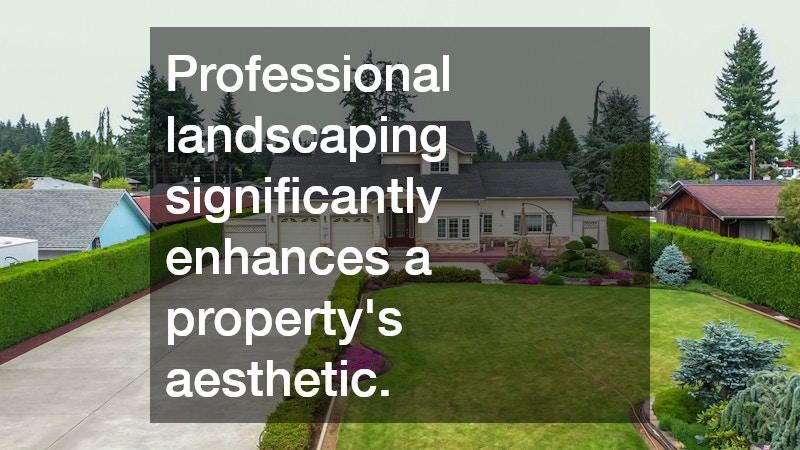How Professional Landscaping Boosts Curb Appeal and Property Value
This section will provide an overview of the role professional landscaping plays in enhancing both the aesthetic appeal and the monetary value of a property. It will highlight the emerging trends in the landscaping industry and introduce the key questions that will be explored in the article.
What Are the Benefits of Professional Landscaping?
Enhancing Visual Appeal
Professional landscaping significantly enhances a property’s aesthetic, creating a welcoming environment that captivates potential buyers and guests. A well-designed landscape incorporates the natural beauty of flora, highlighting seasonal colors and textures to enhance visual appeal.
Incorporating elements such as flower beds, pruned shrubs, and well-maintained lawns contributes to an inviting exterior. Such attention to detail not only pleases those who visit but also elevates the overall perception of the property’s worth.
Trends in landscaping now focus on sustainable design, which includes native plant species that are not only beautiful but also environmentally responsible. This approach not only attracts eco-conscious buyers but also reduces maintenance costs, providing long-term benefits to homeowners.
Increasing Property Value
Strategic landscaping is a powerful tool in boosting the market value of a property. By investing in professional landscaping services, homeowners can see a substantial return on investment, with estimates suggesting a possible 5-12% increase in property value.
Well-planned landscapes create harmony and balance, complementing the property’s architectural style and fostering a positive first impression. This increased appeal can expedite the sale of a home, attracting more interested buyers who are willing to pay a premium for a well-maintained exterior.
Moreover, as buyers become more discerning, properties with professional landscaping are viewed as more desirable due to their reduced need for immediate repairs or upgrades. This perception of lower future maintenance costs increases the property’s competitiveness in the market.
How Does Landscaping Affect Energy Efficiency?
Shading and Cooling
Properly designed landscapes contribute to energy efficiency by naturally cooling the environment. Trees and strategically placed plants can provide shade, reducing the heat absorbed by buildings and lowering cooling costs.
In the summer months, shaded areas can decrease the temperature by up to 6 degrees, providing significant energy savings. This form of natural cooling is not only cost-effective but also environmentally friendly, reducing the need for air conditioning.
The US Department of Energy notes that a well-designed landscape saves enough energy to potentially reduce overall home energy costs by 25%. This savings highlights the dual benefit of aesthetic enhancement and cost efficiency delivered by professional landscaping.
Windbreaks and Insulation
Landscaping also plays a crucial role in creating natural windbreaks that insulate properties against harsh weather conditions. Trees and shrubs can act as barriers, slowing down wind velocity and providing a form of natural insulation.
In colder months, these windbreaks help reduce heating costs by minimizing heat loss from buildings. They serve as a buffer zone, trapping heat inside and keeping cold winds from penetrating the building envelope.
This strategic placement of natural elements not only creates a cozy, sheltered environment but also demonstrates the long-term savings that thoughtful landscaping can provide. By reducing the dependency on artificial heating and cooling, homeowners lower their carbon footprint as well.
What Should Be Considered When Hiring a Professional Landscaper?
Assessing Qualifications and Experience
When choosing a professional landscaper, homeowners should prioritize qualifications and experience to ensure quality results. It’s essential to verify credentials, including certifications and affiliations with professional associations.
Experience indicates the landscaper’s ability to design and execute a plan that suits the unique features of the property. A seasoned professional brings a depth of knowledge that can anticipate challenges and transform vision into reality.
Finding a landscaper who understands the local climate and native species is also crucial. This understanding not only ensures the health and longevity of the landscape but also aligns with sustainable practices which are increasingly important to today’s homebuyers.
Designing a Customized Landscape Plan
Collaborating with a professional to create a customized landscape plan is key to achieving desired goals. A tailored plan takes into account the property’s specific needs, as well as the owner’s lifestyle and maintenance preferences.
Understanding the property’s soil type, sunlight exposure, and existing features allows for a design that maximizes the landscape’s potential. This customization ensures that the finished project not only meets aesthetic desires but is also functional and sustainable.
Moreover, a professional landscape plan offers a clear roadmap, reducing unexpected expenses and ensuring the project stays within budget. Through careful planning and execution, homeowners achieve a harmonious outdoor space that complements and enhances their property.
Conclusion
The conclusion will summarize the main points discussed in the article, emphasizing the transformative potential of professional landscaping in boosting curb appeal and property value, while also reiterating the considerations and benefits outlined in the previous sections. Professional landscaping not only enhances visual appeal but also increases property value, offering homeowners a significant return on investment. Furthermore, the positive impact on energy efficiency due to strategic design elements, such as shading, cooling, and windbreaks, underscores the value of investing in professional landscaping services.


